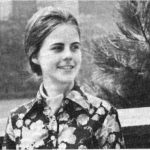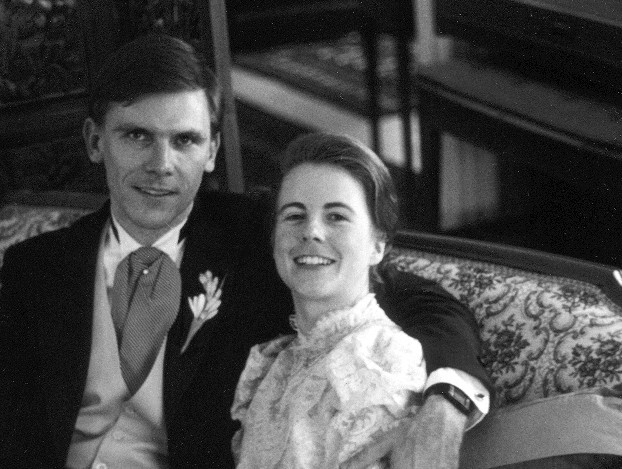Sharon Worthing Vaino
A Woman’s First Steps at Yale
It was the first year that Yale College had officially become coed. As an entering woman freshman, I was filled with the usual anxieties and expectations. How would I adjust to the social and academic pressures of college life? Though I had been away from home before, I had never been presented with so many opportunities and freedoms as at Yale, and I wanted to explore as much as possible.
Looking back over the years, I can say that these experiences [at Yale] were foundational to everything in my life thereafter.
A Woman’s First Steps at Yale
This article, reprinted from the Fall 1975 Standard, recounts experiences of Sharon Worthing (now Sharon Worthing Vaino), who entered Yale as a freshman in the fall of 1970, the first year that Yale College officially went co-ed. A limited number of women such as faculty daughters had been admitted the previous year to try out the experience.
Sitting at my desk in 54 Vanderbilt, I pulled out the contents of a brown envelope which had been left for me. “Student Revivals Awaken Campuses,” I saw printed in bold type across the top of the paper, which was called The Yale Standard. I looked briefly at the following pages. There was a picture of young people with uplifted hands, doubtless having some sort of religious experience. “Humph, fundamental religion,” I thought. Surely I was too sophisticated to go for something like that. I laid the paper aside and don’t recall looking at it again.
It was the first year that Yale College had officially become coed. As an entering woman freshman, I was filled with the usual anxieties and expectations. How would I adjust to the social and academic pressures of college life? Though I had been away from home before, I had never been presented with so many opportunities and freedoms as at Yale, and I wanted to explore as much as possible.
On the night of our welcoming dinner at Silliman College, one of my roommates and I sat with some upperclassmen. We mentioned that she played the violin and I played the piano. “Classical,” I said. “Of course,” one fellow replied. “I could tell by your bearing.”
Another roommate of mine was an attractive blond from California. Every time I saw her in the first few days she was with a different set of Yale men as they dragged another piece of furniture up six flights of stairs into our suite. In a very short time our living room was fully furnished, albeit somewhat shabbily, at minimum effort and no expense.
In October I met some people close to those most active in the SDS* demonstrations the preceding year. My conservative dress and manners contrasted sharply with their habits, but I found these people novel and interesting and associated with them despite our external differences. I carried a washtub bass up to the Silliman attic for a small jug band performance they were giving. “That’s a far cry from a piano!” shouted the fellow who had spoken to me on welcoming night.
Not willing to commit myself too closely to any particular type of people, however, I also developed friendships with members of the Party of the Right, and travelled from one group to another with a facility which would shock anyone of true dedication. I tried Yoga, spoke to members of the United Family, saw a Zen Buddhist, and studied all the religions which could be conveniently packed into an introductory religious studies course.

“Would you like Christ to come into you life?” said one of them. The question made me pause, because… I was certainly more religious than most people I knew. However, I knew there was something lacked….
Though I found many fascinations in the variety around me at Yale, I knew that my life lacked basic direction and purpose. I spent all my high school years grade-grubbing, extracurricular activities-grubbing, and recommendations-grubbing so that I could get into a good college. Now I was in a good college, and I really had no idea where to go from there.
I had always been religious, more or less, and thought the basic answers to life could be found through religion. The question was, what one? Surely they couldn’t all be right.
The oriental religions I sampled, though intense, were basically dissatisfying. The goal of higher consciousness was elusive, self-centered, and somehow empty. The churches I went to lacked vitality and preached little but what most of their congregations had already – general good neighborliness.
I ended up in Quaker meetings, not because of what they did but because of what they didn’t do – the New Haven meeting usually passed in complete silence. At least there was nothing said which I disagreed with.
Through it all I knew inside that I lacked a relationship with God. Thought I wanted to do the will of God, I had no way of knowing whether I was doing the will of God or not.
A friend of mine told me that a mutual acquaintance of ours had become a Christian. “Become a Christian? What does he mean?” I thought. In my mind, all of my Gentile contemporaries were Christians unless proven otherwise. But I heard that this fellow was taking definite action which he believed was according to the will of God. I decided to go talk to him to see if he had something real. He invited me to a Yale Standard meeting.
About this time I read the first eight chapters of Romans for my religious studies course. I began to understand some of what Paul was saying: Just as Jesus died on the cross and then rose from the dead, so the sinful nature in us was to die, and through the resurrection of Jesus we were to have a new nature and the power to life a life pleasing to God. It was so beautifully simple – I was amazed that I had never seen this before.
At a Standard prayer meeting, however, I listened for a while, then began to argue. What about the Buddhists? How could these people at the meeting say that Christ was the answer? Et cetera. I was just fighting the whole way.
Though, as I later found out, those present had given up hope that they could convince me of anything about halfway through the discussion, they felt they should ask, as a matter of course before closing, if I wanted to receive Jesus as my Savior.
“Would you like Christ to come into your life?” said one of them.
The question made me pause, because I thought Christ was already in my life. I was certainly more religious than most people I knew. However, I knew there was something I lacked. To everyone’s surprise, I said, “Yes.”
I asked God’s forgiveness for my sins and received Jesus as my Savior right then. It was a simple prayer, but I knew that something important was happening as I prayed; it was as if something intangible broke. “You’ve been born again,” one of them told me. “What’s that?” I wondered.
They advised me to read the Bible when I returned to my room, and I did so. It was not the same as it had been. For the first time I felt that God was speaking to me directly through the words.
I knew that I did not have to worry any more about how to find God; I had found Him. More importantly, He had found me.
Later I learned what it means to be born again. Jesus, who never sinned, bore the sins of all the people of the world when He hung upon the cross and paid the inevitable penalty for sin, death. He rose again, victorious over sin, death, and hell. Because He died for us we can ask God’s forgiveness for our sins and receive the righteousness of Jesus. At that point, a whole new life will open up if we are willing.
Though I was born again and had been going to prayer meetings, I still kept up many of my old patterns. My SDS-associated friends, who had Marxist leanings and a dim view of my religious conversion, were beginning to put a lot of pressure on me to change my dress, life-style, and basic personality and values. Having studied psychology and sociology, they very penetratingly analyzed my faults, and they were right. But the answers they proposed were not. When one of them threw a glass against the wall after a session I had with them, I knew I had better make a decision fast.
I told a friend that I felt as if I were on a stream with each hand and foot in a separate boat. The boats were beginning to diverge, and if I did not get entirely into one boat, I was going to fall into the water.
After carrying a “Worry List” around with me for about a week, I saw down on the well-worn couch in my suite at Vanderbilt and lifted each of my worries to God. He dissolved every doubt and fear, showing me where it was false, and that He was fully able to take care of my situation. At that point I put my life into God’s hands with no reservations.
I had always been a math-science person (adequate by not inspired); I bolted completely, sold all the used math books the bookstore would buy from me, and majored instead in American history, graduating with honors in the field. I had never planned to go to school beyond college, and the idea of becoming a lawyer had never remotely occurred to me. Yet I am now in law school, not because, as with some, I cannot think of anything else to do, but because I knew that it is the right thing for me. I transferred from Yale to Barnard College in New York City because Barnard was in some ways better suited to my particular goals.
I could go on much longer about the wonderful things God has done for me. One of the most exciting things about serving God is that He has a pattern which is unique for each of us.
The new life God gives us starts with the first step, salvation through the blood of Jesus. If you will simply invite Him into your life and allow Him to have His way, you will see the changes which only God can bring about.
“Therefore if any man be in Christ, he is a new creature: old things are passed away; behold, all things are become new.” (II Corinthians 5:17)
Sharon Worthing Vaino
Postscript: Looking back over the years, I can say that these experiences were foundational to everything in my life thereafter. I spent over three decades practicing as an attorney in Manhattan, and have been blessed with a wonderful husband, son, and daughter-in-law. The life of walking by faith in Jesus continues to unfold before me.
*The Students for a Democratic Society were a radical leftist group with chapters in colleges across the country. Their protests seriously disrupted operations at Columbia University in 1968-69.

